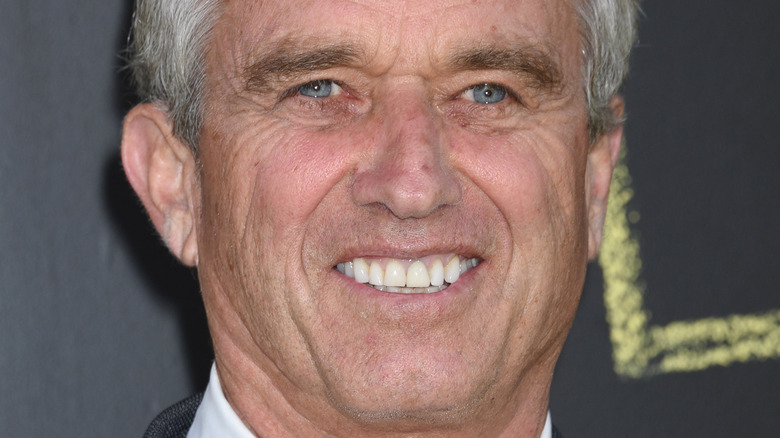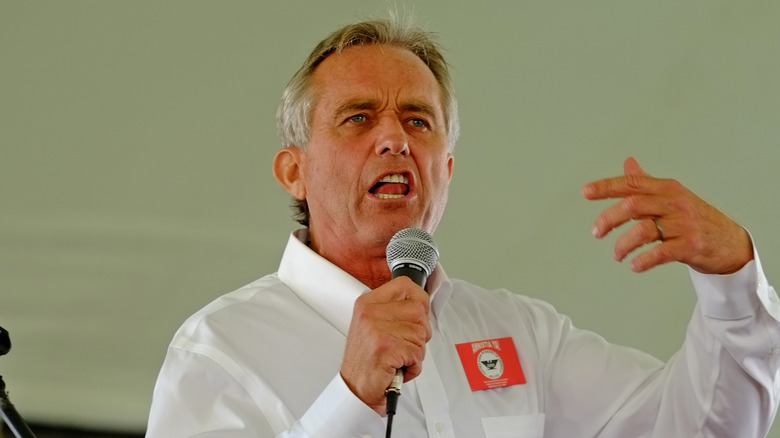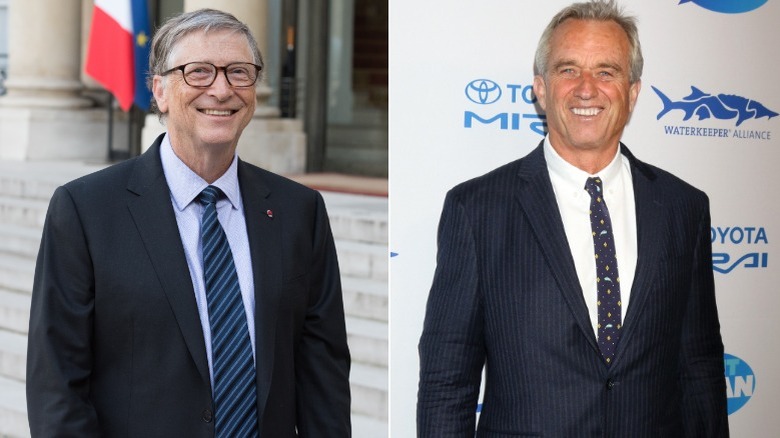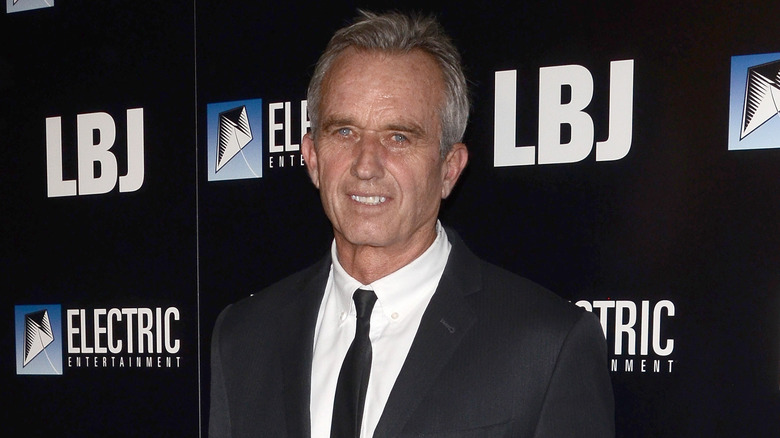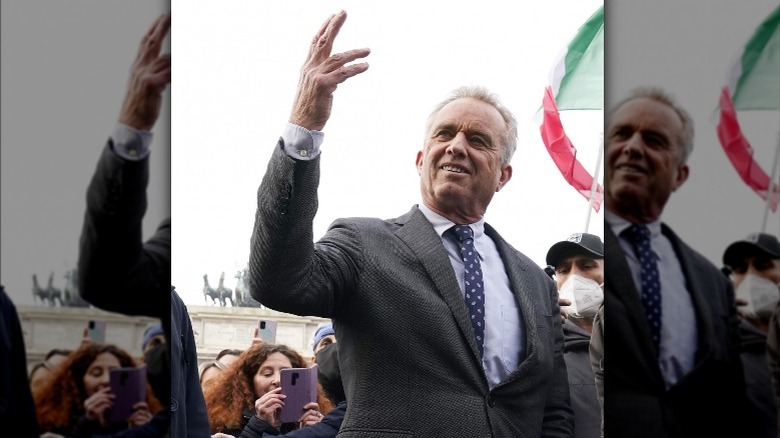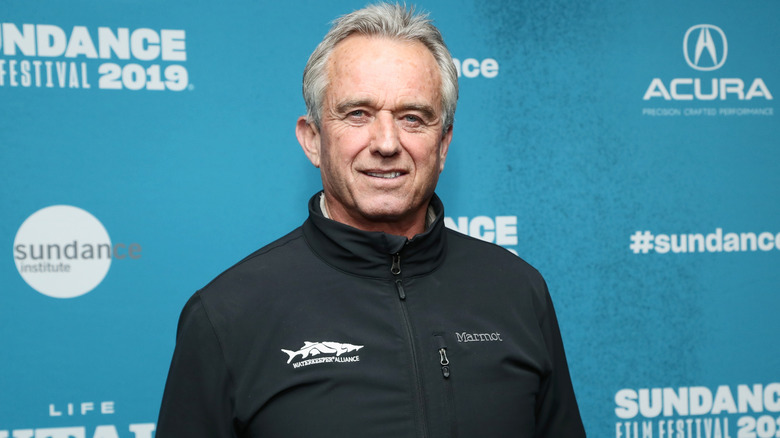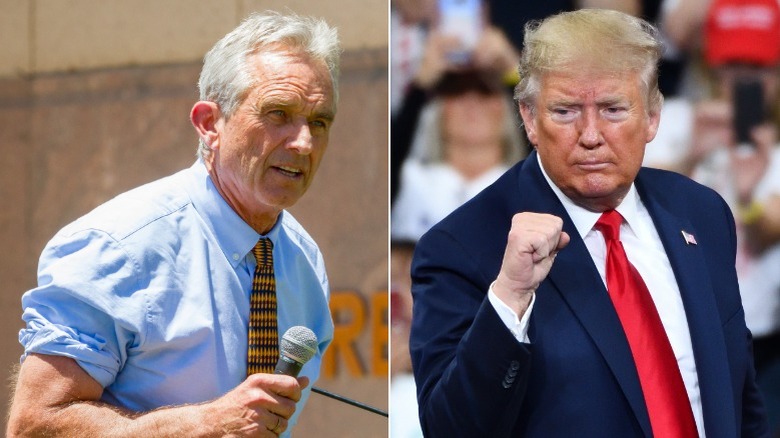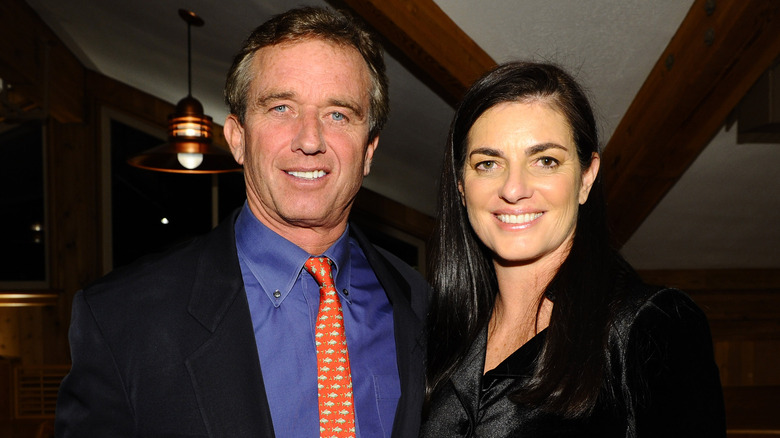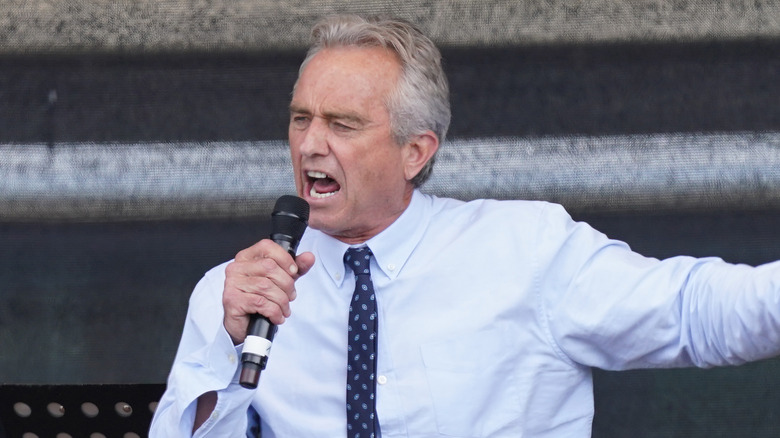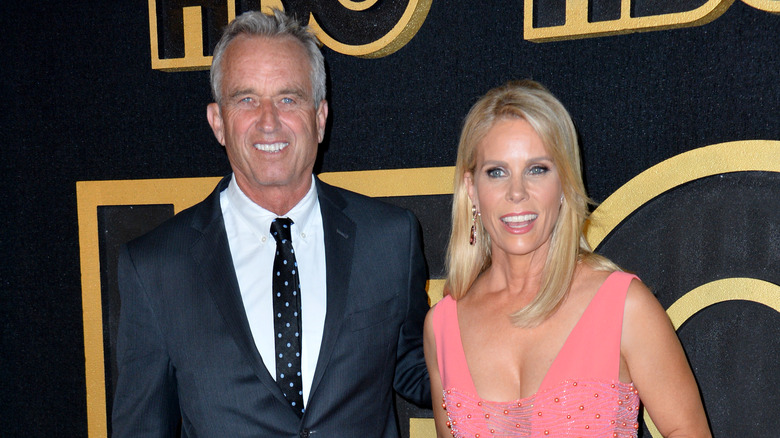The Shady Side Of Robert F. Kennedy Jr.
The Kennedy family is inarguably one of the most intriguing families in America. Their lives have been marred by mystery, loss, and controversy, and it seems people simply can't get enough of them. From the strange facts that surrounded John F. Kennedy Jr.'s marriage to the untold truth of Robert F. Kennedy's missing granddaughter, members of the Kennedy family have always been in the spotlight.
In recent years, one of the biggest headline makers has been Robert F. Kennedy Jr. The son of Robert F. Kennedy, he's the nephew of former President John F. Kennedy and the cousin of John F. Kennedy Jr. Like so many of his relatives, he's been involved in both law and politics. As an environmental lawyer, he received major accolades and was even crowned one of Time magazine's "Heroes for the Planet" for his work with Riverkeeper, an organization that "protects and restores the Hudson River." However, those accolades have faded away over the years as questionable comments, beliefs, and actions have overshadowed most other aspects of his life. His marriage to actress Cheryl Hines has been dubbed strange, and, in February 2021, he was even banned from Instagram. However, it's his unapologetic-yet-debunked beliefs about everything from 5G to vaccines that have made many turn against him. This is the shady side of Robert F. Kennedy Jr.
He 'distorted' vaccine science long before COVID-19
Years before COVID-19 sparked vaccine debates, Robert F. Kennedy Jr. was already questioning the safety and efficacy of inoculation, though his conviction began in an unlikely place. Kennedy got his professional start as an environmental lawyer, per Tortoise, and as the outlet noted, it was while researching and speaking about the dangers of mercury in America's rivers that he was first approached by a psychologist named Sarah Bridges. She wondered if mercury inside vaccines could have caused her son's autism. Kennedy was intrigued and soon, he was investigating thimerosal, a mercury-based vaccine preservative. As Kennedy put it, he had "always been pro-vaccine" and had gotten all of his kids vaccinated, but after reading about thimerosal, he was "dumbstruck by the gulf between scientific reality and the media consensus."
In 2005, Kennedy published an article called "Deadly Immunity," which argued that some allergies (and autism) were linked to vaccines, per Vanity Fair. He also claimed that "public-health authorities knowingly allowed the pharmaceutical industry to poison an entire generation of American children," per Scientific American. However, he omitted the fact that thimerosal was removed from most childhood vaccines in 2001. As McGill University pointed out, his whole article was "riddled with mistakes, distorted quotes, and unsubstantiated fearmongering." But Kennedy wasn't fazed by the criticism, instead telling Tortoise he was accustomed to the fact that people "don't like me." He added, "I'm suing the pharmaceutical industry."
Robert F. Kennedy Jr.'s attack on Bill Gates
Robert F. Kennedy Jr. doesn't trust Bill Gates. He believes the billionaire wanted to use the COVID-19 vaccine to inject people with microchips that would hold "all your money," per Forbes. That way, "if you refuse a vaccine, we turn off the chip and you starve!" Kennedy also claimed that Gates and Dr. Anthony Fauci would profit from the vaccine. "The welfare of humanity is always the alibi of tyrants," he once wrote on Instagram, per Tortoise. Another time, he posted a meme of the men as Dr. Evil and Mini-Me from "Austin Powers," writing, "We have a vaccine to save the world. It's going to cost you $6 trillion dollars." He even wrote a book titled, "The Real Anthony Fauci: Bill Gates, Big Pharma, and the Global War on Democracy and Public Health."
However, one of his wildest claims has been that Gates has a "god-like willingness to experiment with the lives of lesser humans." Kennedy alleged "the most frightening epidemics in Congo, the Philippines, and Afghanistan are all linked to Gates' vaccines" and blamed him for a "devastating vaccine-strain polio epidemic that paralyzed 496,000 children" in India, all claims that PolitiFact has debunked. Kennedy stood by them, however, telling Tortoise that "every statement that I make is fact-checked." He asked, "Are you saying to me that Bill Gates has not invested in technologies for sub-dermal chipping?" claiming that Gates invested $23 million "in an MIT project to microchip people."
He's spread 5G conspiracy theories
Robert F. Kennedy Jr. has gotten behind many questionable theories, including that 5G may cause physical harm to humans. As Tortoise discovered, Kennedy began posting about 5G weekly in 2019, spreading "claims that 5G damages human DNA, causes cancer, and is being installed in order to carry out mass surveillance." Indeed, looking at his socials from 2020 revealed he's shared various articles pushing fear, including tweeting claims that 5G "could have almost unimaginably devastating impacts on our health + environment." Unfortunately for Kennedy, a professor from University College London explained why all of the fears he allegedly believes and promotes are mere conspiracy theories. As they explained, "The signal humans would face being in close proximity would not be dangerous."
Despite this, as always, Kennedy has stuck by his beliefs. "Show me a study that says 5G is safe," he challenged Tortoise. "Show me one, because I can show you 10,000. That's not hyperbole 10,000," he claimed, repeating that 5G causes "cancer" and "DNA dysfunction," and "penetrates the blood brain barrier. It's making our children stupider and sicker." He told the publication, "I'm suing FCC on 5G and these products that are injuring people." Honing in on the FCC, he claimed that the real conspiracy is how "they take advertising and the press and they compromise journalists like yourself and, you know, they get people on their side."
He's sure Sirhan Sirhan didn't kill his father
Sirhan Sirhan was convicted of killing Robert F. Kennedy Jr.'s father, Sen. Robert F. Kennedy, in 1968. Though sentenced to life in prison, 50 years later, the California Board of Parole Hearings concluded he wasn't a threat to society and recommended his parole. Max Kennedy told The Atlantic his family was "devastated" by the decision, but RFK Jr. seemingly felt otherwise. In December 2021, he penned an op-ed for the San Francisco Chronicle which called on California Governor Gavin Newsom to "set [Sirhan] free." He wrote how he and "two of my nine surviving siblings feel strongly that Sirhan's release best reflects my father's legacy." He also shared details from his three-hour meeting with Sirhan in 2018, calling him "gentle, humble, kind hearted, frail and harmless."
However, Kennedy Jr. wasn't just calling for forgiveness; he wanted a reexamination of the facts. He proclaimed "Sirhan Sirhan didn't kill my father," alleging that investigators "bullied and badgered eyewitnesses to change their statements." He wrote that police "inexplicably and illegally destroyed thousands of pieces of evidence." Kennedy Jr. then urged the governor to "consider the overwhelming evidence that Sirhan is not my father's killer." He claimed that a "recently hired security guard," Thane Eugene Cesar, was the one who was guilty and "called for a new investigation into the case." Joseph P. Kennedy II fired back that "emotions and opinions do not change facts or history." Sirhan was denied parole in January 2022.
Robert F. Kennedy's eerie connection to a 1975 murder
In 1975, 15-year-old Martha Moxley was killed with a golf club, and, decades later, the case is as perplexing as ever. According to "48 Hours," she visited her "very wealthy neighbors" — brothers Michael and Tommy Skakel, cousins of the Kennedys — the night she died. Tommy was reportedly the last to see her, having had a "semi-sexual encounter" with her, while Michael maintained he was watching a movie "miles away." He later amended his story to say he climbed a tree outside Moxley's window and masturbated when he returned home from the movie. In 2000, Michael was charged with her murder and sentenced to 20 years to life in prison.
In a surprising twist, Robert F. Kennedy Jr. vowed to exonerate his cousin. In 2003, he proclaimed Michael "didn't commit the crime" and in an op-ed for The Atlantic, he suggested the Skakels' live-in tutor, Kenneth Littleton, may have been the murderer. Eight months later, he was contacted by a former classmate of Michael's, Tony Bryant, who said Al Hasbrouck and Burton Tinsley "were involved." Kennedy bought into that theory, though Bryant wouldn't testify, so the judge dismissed his claims. Undeterred, Kennedy penned a 2016 book called "Framed" in which he maintained Hasbrouck and Tinsley's guilt. Prosecutors called his allegations "baseless," but Kennedy insisted there was "plenty" of evidence against them. In 2018, Michael's murder conviction was thrown out and in 2020, prosecutors dismissed the murder charge and a possible retrial.
He wanted to chair Trump's vaccine safety commission
In January 2017, Robert F. Kennedy Jr. told reporters that then-President-Elect Donald Trump had asked him to "chair a commission on vaccine safety and scientific integrity," per Reuters. "I said I would," he confirmed, explaining that Trump was "very pro-vaccine, as am I," but that he had "some doubts about the current vaccine policy." The only problem was that Kennedy wasn't exactly offered said position. Trump spokeswoman Hope Hicks told Reuters that, though the pair had talked about a possible commission, "no decisions have been made."
Shortly after the meeting, ScienceInsider approached Kennedy for clarification. He told the outlet that Trump had reached out to him and that they spoke for an hour. He claimed Trump was "troubled" by possible "links between certain vaccines and the epidemic of neurodevelopmental disorders, like autism." He also revealed that the proposed commission would have "a dozen people," including scientists and "prominent Americans." He was adamant he'd be a good fit because of his "expertise" in "reading science and spotting junk science." Assuring that "nobody is trying to get rid of vaccines here," he quipped, "I have been tracking mercury in fish for 30 years and nobody has called me antifish." In the end, Trump seemingly abandoned all plans for the commission by February 2018. Kennedy wasn't impressed, telling The Guardian "corruption" was to blame and alleging that Trump was "on the side of the industry and against science."
Robert F. Kennedy's estranged wife's death sparked questions
Robert F. Kennedy Jr.'s personal life took a tragic turn when his estranged wife, Mary Richardson Kennedy, took her own life in 2012, per ABC News. The couple had four kids and were married for 16 years when Robert filed for divorce in 2010. As Mary's matrimonial attorney, Peter Bienstock, told The Daily Beast, she "never wanted a divorce." Consequently, a friend claimed she began drinking "to mask her pain" and "eventually, it took over." She temporarily lost custody of her children, which allegedly pushed her over the edge. Bienstock argued that Robert "engineered temporary custody for himself as a means of forcing Mary" into a divorce and slammed, "Depression and drinking didn't kill Mary — it was having her kids taken away."
According to reports, Robert's behavior towards Mary was shady. Her divorce attorneys claimed he cut her off from a court-approved credit card and a source told the New York Post, "Mary was left to sometimes ask for $20 from the parents of her kids' classmates to buy gas and groceries." Mary's caretaker told police that, a day before her death, she "asked me to pray for her, because she got more bad news from her lawyer." She said Mary called Robert, but he refused to help because "she doesn't want to help herself." Mary's family dubbed Robert's affidavit "full of vindictive lies," per Buffalo News, and proof of the "emotional and psychological abuse that Mary endured."
He invoked Nazi Germany during an anti-vax speech
On January 23, 2022, Robert F. Kennedy Jr. spoke at the Defeat the Mandates rally in Washington, D.C., where he chose to invoke Nazi Germany to explain his issue with vaccine mandates. His "historically inaccurate anti-Semitic remark" compared the U.S. to a totalitarian state and, as CNN noted, went as far as to seemingly imply that Anne Frank had a better life than many contemporary Americans did. "Even in Hitler Germany ... you could cross the Alps into Switzerland. You could hide in an attic, like Anne Frank did," he proclaimed. Kennedy then added that during a 1962 visit to East Germany he "met people who had climbed the wall and escaped, so it was possible. Many died, true, but it was possible."
Condemnation was swift. The Auschwitz Memorial tweeted, in part, that the comments were "a sad symptom of moral and intellectual decay," while the U.S. Holocaust Memorial Museum added, in part, that "making reckless comparisons to the Holocaust, the murder of six million Jews, for a political agenda is outrageous and deeply offensive." Kennedy's family also quickly turned against him. His wife, "Curb Your Enthusiasm" star Cheryl Hines, tweeted, in part, that his statement was "reprehensible and insensitive," underscoring that "his opinions are not a reflection of my own." His sister, Kerry Kennedy, took to Instagram writing, in part, "Bobby's lies and fear-mongering yesterday were both sickening and destructive." She added, "I strongly condemn him for his hateful rhetoric."
Robert F. Kennedy Jr. tried to walk back his comments — sort of
A day after he made headlines for his "offensive anti-vaccine speech" delivered at the Lincoln Memorial, Robert F. Kennedy Jr. tried to backtrack and issued an apology on Twitter. "I apologize for my reference to Anne Frank, especially to families that suffered the Holocaust horrors," he began. "My intention was to use examples of past barbarism to show the perils from new technologies of control. To the extent my remarks caused hurt, I am truly and deeply sorry."
Contrary to what he was surely hoping for, people weren't quick to forgive him, however. Honing in on the statement's last sentence, one Twitter user noted that it was a way "to apologise [sic] without apologising [sic]." Another slammed, in part, "Your intent was to get the attention that you received. Don't lie." However, Kennedy stood by his comments, as well as his apology for them. Issuing a statement to NBC News, he said, "I referred to Anne Frank's terrible two year ordeal only by way of showing that modern surveillance capacity would make her courageous feat virtually impossible today." He then tried to turn the tables on his critics and alleged that "characterizing this discussion as 'anti-Semitic' is unfair and cheapens a term that should always retain its terrible power." It wasn't a convincing argument, however. As Jonathan Greenblatt, the CEO of the Anti-Defamation League, tweeted in part, Kennedy's comparison was "deeply inaccurate, deeply offensive and deeply troubling."

